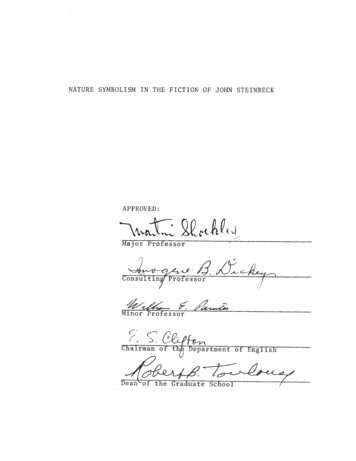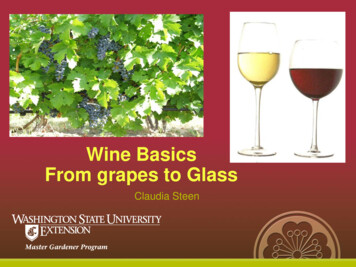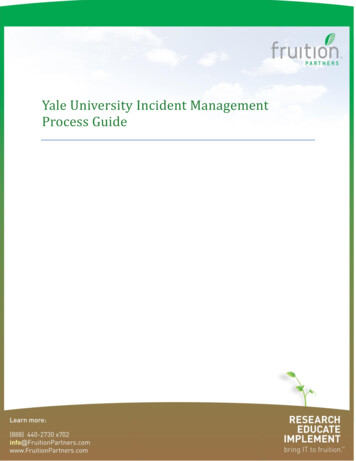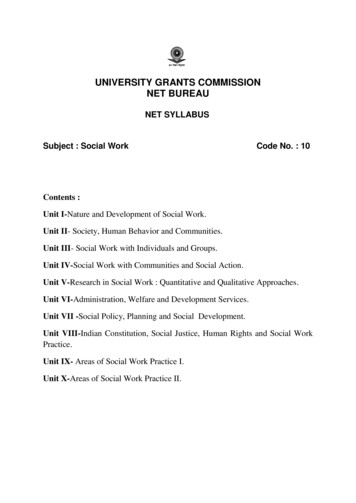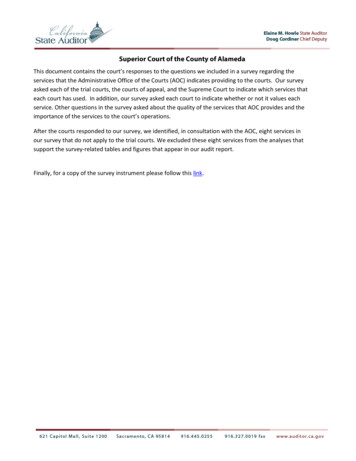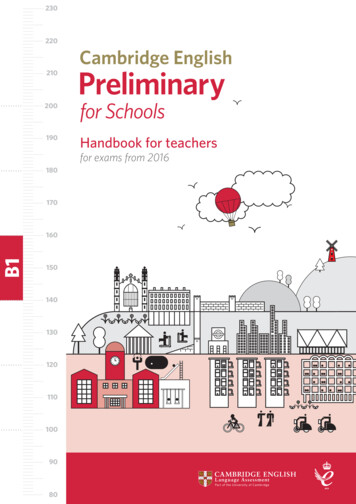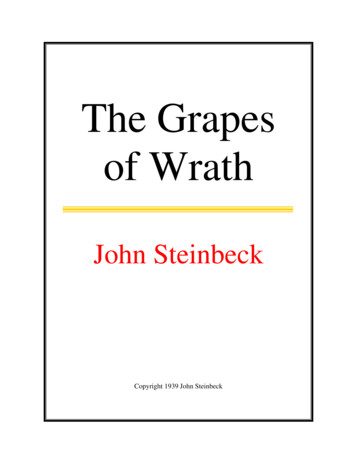
Transcription
The Grapesof WrathJohn SteinbeckCopyright 1939 John Steinbeck
ToCAROLWho willed this bookToTOMWho lived it
1TO THE RED COUNTRY and part of the gray country of Oklahoma, the last rainscame gently, and they did not cut the scarred earth. The plows crossed and recrossedthe rivulet marks. The last rains lifted the corn quickly and scattered weed colonies andgrass along the sides of the roads so that the gray country and the dark red countrybegan to disappear under a green cover. In the last part of May the sky grew pale andthe clouds that had hung in high puffs for so long in the spring were dissipated. Thesun flared down on the growing corn day after day until a line of brown spread alongthe edge of each green bayonet. The clouds appeared, and went away, and in a whilethey did not try any more. The weeds grew darker green to protect themselves, andthey did not spread any more. The surface of the earth crusted, a thin hard crust, and asthe sky became pale, so the earth became pale, pink in the red country and white in thegray country.In the water-cut gullies the earth dusted down in dry little streams. Gophers and antlions started small avalanches. And as the sharp sun struck day after day, the leaves ofthe young corn became less stiff and erect; they bent in a curve at first, and then, as thecentral ribs of strength grew weak, each leaf tilted downward. Then it was June, andthe sun shone more fiercely. The brown lines on the corn leaves widened and moved inon the central ribs. The weeds frayed and edged back toward their roots. The air wasthin and the sky more pale; and every day the earth paled.In the roads where the teams moved, where the wheels milled the ground and thehooves of the horses beat the ground, the dirt crust broke and the dust formed. Everymoving thing lifted the dust into the air: a walking man lifted a thin layer as high as hiswaist, and a wagon lifted the dust as high as the fence tops, and an automobile boiled acloud behind it. The dust was long in settling back again.When June was half gone, the big clouds moved up out of Texas and the Gulf, highheavy clouds, rainheads. The men in the fields looked up at the clouds and sniffed atthem and held wet fingers up to sense the wind. And the horses were nervous while theclouds were up. The rainheads dropped a little spattering and hurried on to some othercountry. Behind them the sky was pale again and the sun flared. In the dust there weredrop craters where the rain had fallen, and there were clean splashes on the corn, andthat was all.A gentle wind followed the rain clouds, driving them on northward, a wind thatsoftly clashed the drying corn. A day went by and the wind increased, steady,unbroken by gusts. The dust from the roads fluffed up and spread out and fell on theweeds beside the fields, and fell into the fields a little way. Now the wind grew strongand hard and it worked at the rain crust in the corn fields. Little by little the sky wasdarkened by the mixing dust, and the wind felt over the earth, loosened the dust, andcarried it away. The wind grew stronger. The rain crust broke and the dust lifted up outof the fields and drove gray plumes into the air like sluggish smoke. The corn threshedthe wind and made a dry, rushing sound. The finest dust did not settle back to earthnow, but disappeared into the darkening sky.
The wind grew stronger, whisked under stones, carried up straws and old leaves,and even little clods, marking its course as it sailed across the fields. The air and thesky darkened and through them the sun shone redly, and there was a raw sting in theair. During a night the wind raced faster over the land, dug cunningly among therootlets of the corn, and the corn fought the wind with its weakened leaves until theroots were freed by the prying wind and then each stalk settled wearily sidewaystoward the earth and pointed the direction of the wind.The dawn came, but no day. In the gray sky a red sun appeared, a dim red circle thatgave a little light, like dusk; and as that day advanced, the dusk slipped back towarddarkness, and the wind cried and whimpered over the fallen corn.Men and women huddled in their houses, and they tied handkerchiefs over theirnoses when they went out, and wore goggles to protect their eyes.When the night came again it was black night, for the stars could not pierce the dustto get down, and the window lights could not even spread beyond their own yards.Now the dust was evenly mixed with the air, an emulsion of dust and air. Houses wereshut tight, and cloth wedged around doors and windows, but the dust came in so thinlythat it could not be seen in the air, and it settled like pollen on the chairs and tables, onthe dishes. The people brushed it from their shoulders. Little lines of dust lay at thedoor sills.In the middle of that night the wind passed on and left the land quiet. The dust-filledair muffled sound more completely than fog does. The people, lying in their beds,heard the wind stop. They awakened when the rushing wind was gone. They layquietly and listened deep into the stillness. Then the roosters crowed, and their voiceswere muffled, and the people stirred restlessly in their beds and wanted the morning.They knew it would take a long time for the dust to settle out of the air. In the morningthe dust hung like fog, and the sun was as red as ripe new blood. All day the dust sifteddown from the sky, and the next day it sifted down. An even blanket covered the earth.It settled on the corn, piled up on the tops of the fence posts, piled up on the wires; itsettled on roofs, blanketed the weeds and trees.The people came out of their houses and smelled the hot stinging air and coveredtheir noses from it. And the children came out of the houses, but they did not run orshout as they would have done after a rain. Men stood by their fences and looked at theruined corn, drying fast now, only a little green showing through the film of dust. Themen were silent and they did not move often. And the women came out of the housesto stand beside their men—to feel whether this time the men would break. The womenstudied the men's faces secretly, for the corn could go, as long as something elseremained. The children stood near by, drawing figures in the dust with bare toes, andthe children sent exploring senses out to see whether men and women would break.The children peeked at the faces of the men and women, and then drew careful lines inthe dust with their toes. Horses came to the watering troughs and nuzzled the water toclear the surface dust. After a while the faces of the watching men lost their bemusedperplexity and became hard and angry and resistant. Then the women knew that theywere safe and that there was no break. Then they asked, What'll we do? And the menreplied, I don't know. But it was all right. The women knew it was all right, and thewatching children knew it was all right. Women and children knew deep in themselvesthat no misfortune was too great to bear if their men were whole. The women went into
the houses to their work, and the children began to play, but cautiously at first. As theday went forward the sun became less red. It flared down on the dust-blanketed land.The men sat in the doorways of their houses; their hands were busy with sticks andlittle rocks. The men sat still—thinking—figuring.2A HUGE RED TRANSPORT truck stood in front of the little roadside restaurant.The vertical exhaust pipe muttered softly, and an almost invisible haze of steel-bluesmoke hovered over its end. It was a new truck, shining red, and in twelve-inch letterson its sides—OKLAHOMA CITY TRANSPORT COMPANY. Its double tires were new,and a brass padlock stood straight out from the hasp on the big black doors. Inside thescreened restaurant a radio played, quiet dance music turned low the way it is when noone is listening. A small outlet fan turned silently in its circular hole over the entrance,and flies buzzed excitedly about the doors and windows, butting the screens. Inside,one man, the truck driver, sat on a stool and rested his elbows on the counter andlooked over his coffee at the lean and lonely waitress. He talked the smart listlesslanguage of the roadsides to her. "I seen him about three months ago. He had aoperation. Cut somepin out. I forget what." And she—"Doesn't seem no longer than aweek I seen him myself. Looked fine then. He's a nice sort of a guy when he ain'tstinko." Now and then the flies roared softly at the screen door. The coffee machinespurted steam, and the waitress, without looking, reached behind her and shut it off.Outside, a man walking along the edge of the highway crossed over and approachedthe truck. He walked slowly to the front of it, put his hand on the shiny fender, andlooked at the No Riders sticker on the windshield. For a moment he was about to walkon down the road, but instead he sat on the running board on the side away from therestaurant. He was not over thirty. His eyes were very dark brown and there was a hintof brown pigment in his eyeballs. His cheek bones were high and wide, and strongdeep lines cut down his cheeks, in curves beside his mouth. His upper lip was long,and since his teeth protruded, the lips stretched to cover them, for this man kept his lipsclosed. His hands were hard, with broad fingers and nails as thick and ridged as littleclam shells. The space between thumb and forefinger and the hams of his hands wereshiny with callus.The man's clothes were new—all of them, cheap and new. His gray cap was so newthat the visor was still stiff and the button still on, not shapeless and bulged as it wouldbe when it had served for a while all the various purposes of a cap—carrying sack,towel, handkerchief. His suit was of cheap gray hardcloth and so new that there werecreases in the trousers. His blue chambray shirt was stiff and smooth with filler. Thecoat was too big, the trousers too short, for he was a tall man. The coat shoulder peakshung down on his arms, and even then the sleeves were too short and the front of thecoat flapped loosely over his stomach. He wore a pair of new tan shoes of the kindcalled "army last," hob-nailed and with half-circles like horseshoes to protect the edgesof the heels from wear. This man sat on the running board and took off his cap andmopped his face with it. Then he put on the cap, and by pulling started the future ruinof the visor. His feet caught his attention. He leaned down and loosened the shoelaces,
and did not tie the ends again. Over his head the exhaust of the Diesel enginewhispered in quick puffs of blue smoke.The music stopped in the restaurant and a man's voice spoke from the loudspeaker,but the waitress did not turn him off, for she didn't know the music had stopped. Herexploring fingers had found a lump under her ear. She was trying to see it in a mirrorbehind the counter without letting the truck driver know, and so she pretended to pusha bit of hair to neatness. The truck driver said, "They was a big dance in Shawnee. Iheard somebody got killed or somepin. You hear anything?" "No," said the waitress,and she lovingly fingered the lump under her ear.Outside, the seated man stood up and looked over the cowl of the truck and watchedthe restaurant for a moment. Then he settled back on the running board, pulled a sackof tobacco and a book of papers from his side pocket. He rolled his cigarette slowlyand perfectly, studied it, smoothed it. At last he lighted it and pushed the burningmatch into the dust at his feet. The sun cut into the shade of the truck as noonapproached.In the restaurant the truck driver paid his bill and put his two nickels' change in aslot machine. The whirling cylinders gave him no score. "They fix 'em so you can't winnothing," he said to the waitress.And she replied, "Guy took the jackpot not two hours ago. Three-eighty he got.How soon you gonna be back by?"He held the screen door a little open. "Week–ten days," he said. "Got to make a runto Tulsa, an' I never get back soon as I think."She said crossly, "Don't let the flies in. Either go out or come in.""So long," he said, and pushed his way out. The screen door banged behind him. Hestood in the sun, peeling the wrapper from a piece of gum. He was a heavy man, broadin the shoulders, thick in the stomach. His face was red and his blue eyes long andslitted from having squinted always at sharp light. He wore army trousers and highlaced boots. Holding the stick of gum in front of his lips he called through the screen,"Well, don't do nothing you don't want me to hear about." The waitress was turnedtoward a mirror on the back wall. She grunted a reply. The truck driver gnawed downthe stick of gum slowly, opening his jaws and lips wide with each bite. He shaped thegum in his mouth, rolled it under his tongue while he walked to the big red truck.The hitch-hiker stood up and looked across through the windows. "Could ya giveme a lift, mister?"The driver looked quickly back at the restaurant for a second. "Didn't you see theNo Riders sticker on the win'shield?""Sure—I seen it. But sometimes a guy'll be a good guy even if some rich bastardmakes him carry a sticker."The driver, getting slowly into the truck, considered the parts of this answer. If herefused now, not only was he not a good guy, but he was forced to carry a sticker, wasnot allowed to have company. If he took in the hitch-hiker he was automatically a goodguy and also he was not one whom any rich bastard could kick around. He knew hewas being trapped, but he couldn't see a way out. And he wanted to be a good guy. Heglanced again at the restaurant. "Scrunch down on the running board till we get aroundthe bend," he said.
The hitch-hiker flopped down out of sight and clung to the door handle. The motorroared up for a moment, the gears clicked in, and the great truck moved away, firstgear, second gear, third gear, and then a high whining pick-up and fourth gear. Underthe clinging man the highway blurred dizzily by. It was a mile to the first turn in theroad, then the truck slowed down. The hitch-hiker stood up, eased the door open, andslipped into the seat. The driver looked over at him, slitting his eyes, and he chewed asthough thoughts and impressions were being sorted and arranged by his jaws beforethey were finally filed away in his brain. His eyes began at the new cap, moved downthe new clothes to the new shoes. The hitch-hiker squirmed his back against the seat incomfort, took off his cap, and swabbed his sweating forehead and chin with it."Thanks, buddy," he said. "My dogs was pooped out.""New shoes," said the driver. His voice had the same quality of secrecy andinsinuation his eyes had. "You oughtn' to take no walk in new shoes—hot weather."The hiker looked down at the dusty yellow shoes. "Didn't have no other shoes," hesaid. "Guy got to wear 'em if he got no others."The driver squinted judiciously ahead and built up the speed of the truck a little."Goin' far?""Uh-uh! I'd a walked her if my dogs wasn't pooped out."The questions of the driver had the tone of a subtle examination. He seemed tospread nets, to set traps, with his questions. "Lookin' for a job?" he asked."No, my old man got a place, forty acres. He's a cropper, but we been there a longtime."The driver looked significantly at the fields along the road where the corn wasfallen sideways and the dust was piled on it. Little flints shoved through the dusty soil.The driver said, as though to himself, "A forty-acre cropper and he ain't been dustedout and he ain't been tractored out?""'Course I ain't heard lately," said the hitch-hiker."Long time," said the driver. A bee flew into the cab and buzzed in back of thewindshield. The driver put out his hand and carefully drove the bee into an air streamthat blew it out of the window. "Croppers going fast now," he said. "One cat' takes andshoves ten families out. Cat's all over hell now. Tear in and shove the croppers out.How's your old man hold on?" His tongue and his jaws became busy with theneglected gum, turned it and chewed it. With each opening of his mouth his tonguecould be seen flipping the gum over."Well, I ain't heard lately. I never was no hand to write, nor my old man neither."He added quickly, "But the both of us can, if we want.""Been doing a job?" Again the secret investigating casualness. He looked out overthe fields, at the shimmering air, and gathering his gum into his cheek, out of the way,he spat out the window."Sure have," said the hitch-hiker."Thought so. I seen your hands. Been swingin' a pick or an ax or a sledge. Thatshines up your hands. I notice all stuff like that. Take a pride in it."The hitch-hiker stared at him. The truck tires sang on the road. "Like to knowanything else? I'll tell you. You ain't got to guess.""Now don't get sore. I wasn't gettin' nosy.""I'll tell you anything. I ain't hidin' nothin'."
"Now don't get sore. I just like to notice things. Makes the time pass.""I'll tell you anything. Name's Joad, Tom Joad. Old man is ol' Tom Joad." His eyesrested broodingly on the driver."Don't get sore. I didn't mean nothin'.""I don't mean nothin' neither," said Joad. "I'm just tryin' to get along without shovin'nobody around." He stopped and looked out at the dry fields, at the starved tree clumpshanging uneasily in the heated distance. From his side pocket he brought out histobacco and papers. He rolled his cigarette down between his knees, where the windcould not get at it.The driver chewed as rhythmically, as thoughtfully, as a cow. He waited to let thewhole emphasis of the preceding passage disappear and be forgotten. At last, when theair seemed neutral again, he said, "A guy that never been a truck skinner don't knownothin' what it's like. Owners don't want us to pick up nobody. So we got to set here an'just skin her along 'less we want to take a chance of gettin' fired like I just done withyou.""'Preciate it," said Joad."I've knew guys that done screwy things while they're drivin' trucks. I remember aguy use' to make up poetry. It passed the time." He looked over secretly to see whetherJoad was interested or amazed. Joad was silent, looking into the distance ahead, alongthe road, along the white road that waved gently, like a ground swell. The driver wenton at last, "I remember a piece of poetry this here guy wrote down. It was about himan' a couple of other guys goin' all over the world drinkin' and raisin' hell and screwin'around. I wisht I could remember how that piece went. This guy had words in it thatJesus H. Christ wouldn't know what they meant. Part was like this: 'An' there we spieda nigger, with a trigger that was bigger than a elephant's proboscis or the whanger of awhale.' That proboscis is a nose-like. With a elephant it's his trunk. Guy showed me adictionary. Carried that dictionary all over hell with him. He'd look in it while he'spulled up gettin' his pie an' coffee." He stopped, feeling lonely in the long speech. Hissecret eyes turned on his passenger. Joad remained silent. Nervously the driver tried toforce him into participation. "Ever know a guy that said big words like that?""Preacher," said Joad."Well, it makes you mad to hear a guy use big words. 'Course with a preacher it's allright because nobody would fool around with a preacher anyway. But this guy wasfunny. You didn't give a damn when he said a big word 'cause he just done it for ducks.He wasn't puttin' on no dog." The driver was reassured. He knew at least that Joad waslistening. He swung the great truck viciously around a bend and the tires shrilled. "LikeI was sayin'," he continued, "guy that drives a truck does screwy things. He got to.He'd go nuts just settin' here an' the road sneakin' under the wheels. Fella says oncethat truck skinners eats all the time—all the time in hamburger joints along the road.""Sure seem to live there," Joad agreed."Sure they stop, but it ain't to eat. They ain't hardly ever hungry. They're justgoddamn sick of goin'—get sick of it. Joints is the only place you can pull up, an' whenyou stop you got to buy somepin so you can sling the bull with the broad behind thecounter. So you get a cup of coffee and a piece pie. Kind of gives a guy a little rest."He chewed his gum slowly and turned it with his tongue."Must be tough," said Joad with no emphasis.
The driver glanced quickly at him, looking for satire. "Well, it ain't no goddamncinch," he said testily. "Looks easy, jus' settin' here till you put in your eight or maybeyour ten or fourteen hours. But the road gets into a guy. He's got to do somepin. Somesings an' some whistles. Company won't let us have no radio. A few takes a pint along,but them kind don't stick long." He said the last smugly. "I don't never take a drink tillI'm through.""Yeah?" Joad asked."Yeah! A guy got to get ahead. Why, I'm thinkin' of takin' one of themcorrespondence school courses. Mechanical engineering. It's easy. Just study a feweasy lessons at home. I'm thinkin' of it. Then I won't drive no truck. Then I'll tell otherguys to drive trucks."Joad took a pint of whisky from his side coat pocket. "Sure you won't have a snort?"His voice was teasing."No, by God. I won't touch it. A guy can't drink liquor all the time and study likeI'm goin' to."Joad uncorked the bottle, took two quick swallows, recorked it, and put it back inhis pocket. The spicy hot smell of the whisky filled the cab. "You're all wound up,"said Joad. "What's the matter—got a girl?""Well, sure. But I want to get ahead anyway. I been training my mind for a hell of along time."The whisky seemed to loosen Joad up. He rolled another cigarette and lighted it. "Iain't got a hell of a lot further to go," he said.The driver went on quickly, "I don't need no shot," he said. "I train my mind all thetime. I took a course in that two years ago." He patted the steering wheel with his righthand. "Suppose I pass a guy on the road. I look at him an' after I'm past I try toremember ever'thing about him, kind a clothes an' shoes an' hat, an' how he walked an'maybe how tall an' what weight an' any scars, I do it pretty good. I can jus' make awhole picture in my head. Sometimes I think I ought to take a course to be afingerprint expert. You'd be su'prised how much a guy can remember."Joad took a quick drink from the flask. He dragged the last smoke from his ravelingcigarette and then, with callused thumb and forefinger, crushed out the glowing end.He rubbed the butt to a pulp and put it out the window, letting the breeze suck it fromhis fingers. The big tires sang a high note on the pavement. Joad's dark quiet eyesbecame amused as he stared along the road. The driver waited and glanced uneasilyover. At last Joad's long upper lip grinned up from his teeth and he chuckled silently,his chest jerked with the chuckles. "You sure took a hell of a long time to get to it,buddy."The driver did not look over. "Get to what? How do you mean?"Joad's lips stretched tight over his long teeth for a moment, and he licked his lipslike a dog, two licks, one in each direction from the middle. His voice became harsh."You know what I mean. You give me a goin'-over when I first got in. I seen you." Thedriver looked straight ahead, gripped the wheel so tightly that the pads of his palmsbulged, and the backs of his hands paled. Joad continued, "You know where I comefrom." The driver was silent. "Don't you?" Joad insisted."Well—sure. That is—maybe. But it ain't none of my business. I mind my ownyard. It ain't nothing to me." The words tumbled out now. "I don't stick my nose in
nobody's business." And suddenly he was silent and waiting. And his hands were stillwhite on the wheel. A grasshopper flipped through the window and lighted on top ofthe instrument panel, where it sat and began to scrape its wings with its angled jumpinglegs. Joad reached forward and crushed its hard skull-like head with his fingers, and helet it into the wind stream out the window. Joad chuckled again while he brushed thebits of broken insect from his fingertips. "You got me wrong, mister," he said. "I ain'tkeepin' quiet about it. Sure I been in McAlester. Been there four years. Sure these isthe clothes they give me when I come out. I don't give a damn who knows it. An' I'mgoin' to my old man's place so I don't have to lie to get a job."The driver said, "Well—that ain't none of my business. I ain't a nosy guy.""The hell you ain't," said Joad. "That big old nose of yours been stickin' out eightmiles ahead of your face. You had that big nose goin' over me like a sheep in avegetable patch."The driver's face tightened. "You got me all wrong—" he began weakly.Joad laughed at him. "You been a good guy. You give me a lift. Well, hell! I donetime. So what! You want to know what I done time for, don't you?""That ain't none of my affair.""Nothin' ain't none of your affair except skinnin' this here bull-bitch along, an' that'sthe least thing you work at. Now look. See that road up ahead?""Yeah.""Well, I get off there. Sure, I know you're wettin' your pants to know what I done. Iain't a guy to let you down." The high hum of the motor dulled and the song of the tiresdropped in pitch. Joad got out his pint and took another short drink. The truck driftedto a stop where a dirt road opened at right angles to the highway. Joad got out andstood beside the cab window. The vertical exhaust pipe puttered up its barely visibleblue smoke. Joad leaned toward the driver. "Homicide," he said quickly. "That's a bigword—means I killed a guy. Seven years. I'm sprung in four for keepin' my noseclean."The driver's eyes slipped over Joad's face to memorize it. "I never asked you nothin'about it," he said. "I mind my own yard.""You can tell about it in every joint from here to Texola." He smiled. "So long,fella. You been a good guy. But look, when you been in stir a little while, you cansmell a question comin' from hell to breakfast. You telegraphed yours the first timeyou opened your trap." He spatted the metal door with the palm of his hand. "Thanksfor the lift," he said. "So long." He turned away and walked into the dirt road.For a moment the driver stared after him, and then he called, "Luck!" Joad wavedhis hand without looking around. Then the motor roared up and the gears clicked andthe great red truck rolled heavily away.3THE CONCRETE HIGHWAY was edged with a mat of tangled, broken, dry grass,and the grass heads were heavy with oat beards to catch on a dog's coat, and foxtails totangle in a horse's fetlocks, and clover burrs to fasten in sheep's wool; sleeping lifewaiting to be spread and dispersed, every seed armed with an appliance of dispersal,
twisting darts and parachutes for the wind, little spears and balls of tiny thorns, and allwaiting for animals and for the wind, for a man's trouser cuff or the hem of a woman'sskirt, all passive but armed with appliances of activity, still, but each possessed of theanlage of movement.The sun lay on the grass and warmed it, and in the shade under the grass the insectsmoved, ants and ant lions to set traps for them, grasshoppers to jump into the air andflick their yellow wings for a second, sow bugs like little armadillos, ploddingrestlessly on many tender feet. And over the grass at the roadside a land turtle crawled,turning aside for nothing, dragging his high-domed shell over the grass: His hard legsand yellow-nailed feet threshed slowly through the grass, not really walking, butboosting and dragging his shell along. The barley beards slid off his shell, and theclover burrs fell on him and rolled to the ground. His horny beak was partly open, andhis fierce, humorous eyes, under brows like fingernails, stared straight ahead. He cameover the grass leaving a beaten trail behind him, and the hill, which was the highwayembankment, reared up ahead of him. For a moment he stopped, his head held high.He blinked and looked up and down. At last he started to climb the embankment. Frontclawed feet reached forward but did not touch. The hind feet kicked his shell along,and it scraped on the grass, and on the gravel. As the embankment grew steeper andsteeper, the more frantic were the efforts of the land turtle. Pushing hind legs strainedand slipped, boosting the shell along, and the horny head protruded as far as the neckcould stretch. Little by little the shell slid up the embankment until at last a parapet cutstraight across its line of march, the shoulder of the road, a concrete wall four incheshigh. As though they worked independently the hind legs pushed the shell against thewall. The head upraised and peered over the wall to the broad smooth plain of cement.Now the hands, braced on top of the wall, strained and lifted, and the shell cameslowly up and rested its front end on the wall. For a moment the turtle rested. A red antran into the shell, into the soft skin inside the shell, and suddenly head and legssnapped in, and the armored tail clamped in sideways. The red ant was crushedbetween body and legs. And one head of wild oats was clamped into the shell by afront leg. For a long moment the turtle lay still, and then the neck crept out and the oldhumorous frowning eyes looked about and the legs and tail came out. The back legswent to work, straining like elephant legs, and the shell tipped to an angle so that thefront legs could not reach the level cement plain. But higher and higher the hind legsboosted it, until at last the center of balance was reached, the front tipped down, thefront legs scratched at the pavement, and it was up. But the head of wild oats was heldby its stem around the front legs.Now the going was easy, and all the legs worked, and the shell boosted along,waggling from side to side. A sedan driven by a forty-year-old woman approached.She saw the turtle and swung to the right, off the highway, the wheels screamed and acloud of dust boiled up. Two wheels lifted for a moment and then settled. The carskidded back onto the road, and went on, but more slowly. The turtle had jerked
the houses to their work, and the children began to play, but cautiously at first. As the day went forward the sun became less red. It flared down on the dust-blanketed land. The men sat in the doorways of their houses; their hands were busy with stic
